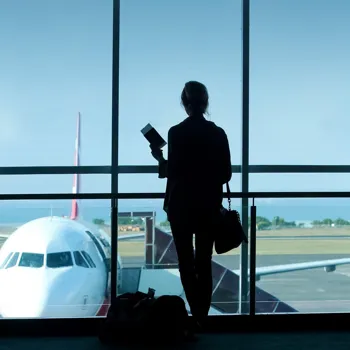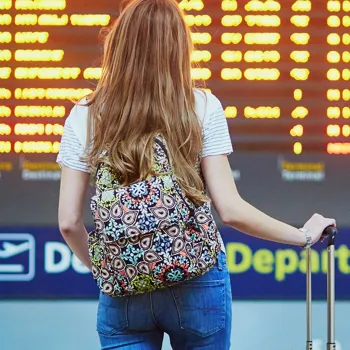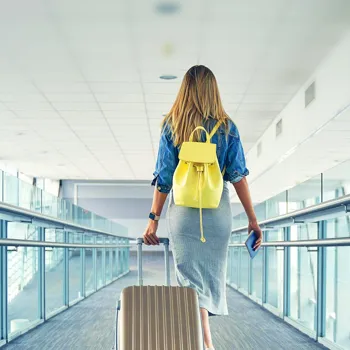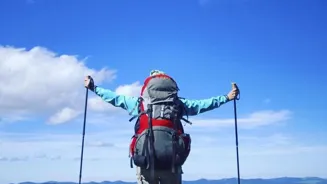Discover Solo Travel Safety: 10 Tips for a Worry-Free Adventure. Journey confidently with essential guidance
Travelling alone can be a truly enriching experience. Imagine exploring the serene backwaters
of Kerala, trekking through the majestic Himalayas, or discovering the historical treasures of Rajasthan – all on your own terms.
The freedom to chart your own course, delve deeper into your interests, and connect with yourself is unparalleled. However, venturing out solo also comes with its own set of considerations, especially concerning safety.
No need to fret, we’ve compiled ten essential tips to ensure your solo adventure is not only memorable but also worry-free. These guidelines can help you navigate your journey with confidence and peace of mind, allowing you to fully embrace the joy of independent exploration.
Diligent Planning is Key:
Before you even pack your bags, invest time in thorough research. Understand the local customs, traditions, and laws of your destination. Knowing what's considered respectful attire, customary greetings, and prohibited activities can help you blend in and avoid unintentional offenses.
Download offline maps and translation apps – these can be lifesavers in areas with limited internet connectivity. Consider sharing your itinerary with a trusted friend or family member, including details like your accommodation bookings, planned activities, and transportation arrangements.
Schedule regular check-ins to keep them updated on your whereabouts. This proactive approach ensures that someone knows your plans and can raise an alarm if necessary. Prior knowledge about the language is always good. Knowing some basic conversation will help you navigate easily.
Accommodation Awareness:
Your choice of accommodation plays a crucial role in your safety. Opt for reputable hotels, guesthouses, or homestays with positive reviews. Look for establishments that have security measures in place, such as secure entrances, surveillance cameras, and on-site staff.
When booking, pay attention to the location – choose areas that are well-lit, centrally located, and easily accessible, especially if you plan to be out and about at night. Once you arrive, familiarize yourself with the emergency exits and fire safety procedures.
Avoid displaying your room number publicly, and be cautious about opening the door to strangers. Keep your valuables locked away in the hotel safe or a secure travel pouch. Trust your instincts – if something feels off, don't hesitate to request a room change or find alternative accommodation.
Essential Documents and Copies:
Safeguarding your important documents is paramount. Keep your passport, visa, and other essential documents in a secure, waterproof pouch. Make multiple copies of these documents – store one set in a separate bag, email a copy to yourself, and leave another copy with a trusted person at home.

Carry a digital backup of your documents on a password-protected USB drive or cloud storage account. This way, even if you lose your original documents, you'll have access to copies that can help you navigate the process of replacing them.
Consider investing in a money belt or hidden pocket to keep your cash and credit cards secure. Diversify your funds, keeping some cash readily accessible and the rest safely concealed. It's also wise to inform your bank about your travel plans to avoid any issues with your credit or debit cards.
Local SIM and Communication:
Upon arrival, consider purchasing a local SIM card. This will give you access to local phone networks, enabling you to make calls, send messages, and access the internet at affordable rates.
Having a local SIM card can be invaluable in case of emergencies, allowing you to contact local authorities, your embassy, or your travel insurance provider. Ensure your phone is unlocked before you travel so that you can easily switch SIM cards.
Download essential apps like emergency contact numbers, local transportation services, and language translation tools. Learn a few basic phrases in the local language, such as "help," "police," and "hospital." These can be incredibly useful in situations where you need assistance.
Transportation Savvy:
Navigating a new place can be daunting, especially when you're alone. Opt for reliable and reputable transportation options. Pre-book airport transfers through trusted services or use official taxi stands. Avoid unlicensed taxis or accepting rides from strangers.
When using public transport, be aware of your surroundings and keep your belongings close. Avoid traveling alone late at night in unfamiliar areas. If possible, choose well-lit and populated routes.
Consider using ride-sharing apps, but always verify the driver's identity and share your ride details with a friend or family member. Before embarking on a long journey, research the local transportation system and plan your route in advance.
Blend In and Be Aware:
One of the best ways to stay safe is to avoid drawing unnecessary attention to yourself. Dress modestly and respectfully, adhering to local customs. Avoid displaying expensive jewelry or gadgets. Be mindful of your body language – project confidence and avoid appearing lost or confused.

Pay attention to your surroundings and trust your instincts. If a situation feels uncomfortable or unsafe, remove yourself from it immediately. Avoid walking alone in poorly lit or deserted areas, especially at night. Be cautious about accepting drinks or food from strangers.
Stay sober and avoid engaging in activities that could impair your judgment. Remember, blending in and being aware can significantly reduce your vulnerability.
Trust Your Instincts:
Your gut feeling is often your best guide. If something doesn't feel right, trust your intuition and don't hesitate to remove yourself from the situation. Don't be afraid to say "no" or to assert yourself if you feel uncomfortable or threatened. It's better to be safe than sorry.

Emergency Contacts and Insurance:
Before you leave, make sure you have readily accessible copies of emergency contact numbers, including local police, ambulance, fire department, and your embassy or consulate. Keep these numbers stored in your phone and in a separate location, in case you lose your phone.
Invest in comprehensive travel insurance that covers medical emergencies, theft, and trip cancellations. Familiarize yourself with the policy details and know how to file a claim. Share your insurance policy details with your emergency contact person.
In the unfortunate event of an emergency, having these resources readily available can make a significant difference.
Limit Sharing Personal Information:
Be cautious about sharing personal information with strangers. Avoid revealing your full itinerary, accommodation details, or travel plans to people you've just met. Be wary of overly friendly individuals who seem too interested in your personal life.
Keep your social media profiles private and avoid posting real-time updates about your location. Sharing too much information can make you a target for scams or theft. It's perfectly fine to be polite and friendly, but maintain a level of discretion to protect your privacy and safety.
Stay Connected:
Even though you're traveling solo, it's important to stay connected with the outside world. Check in with family and friends regularly to let them know you're safe. Use social media or messaging apps to share your experiences and stay in touch with loved ones.
If you're feeling lonely or isolated, reach out to online communities or forums for solo travelers. Sharing your experiences and connecting with others can provide a sense of support and camaraderie, making your solo journey even more enriching.
By following these ten tips, you can embark on your solo adventure with confidence and peace of mind. Remember, safety is paramount, but it shouldn't overshadow the joy of exploration and self-discovery.
Embrace the freedom, immerse yourself in new cultures, and create memories that will last a lifetime. Happy and safe travels!











